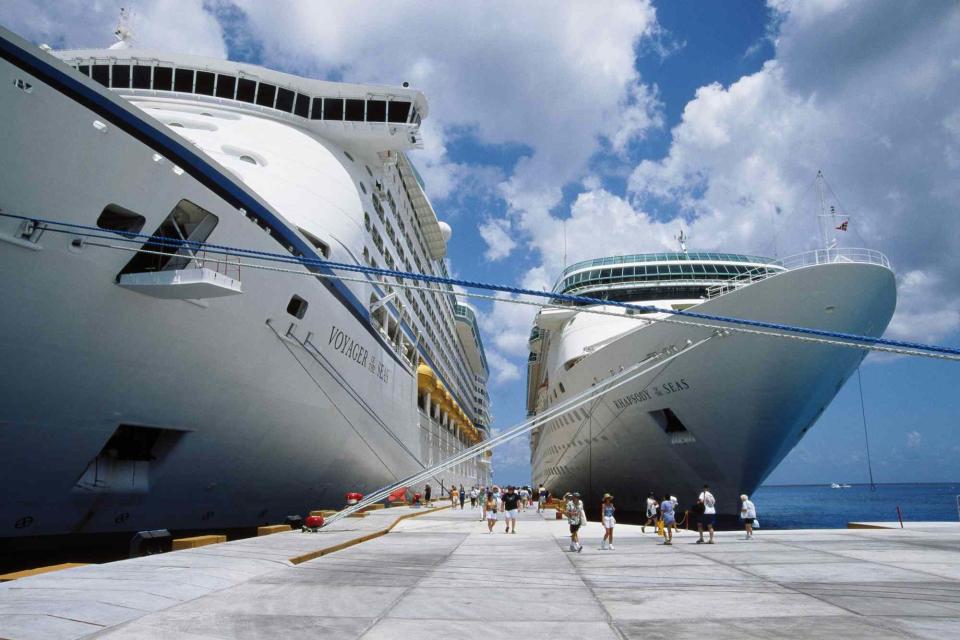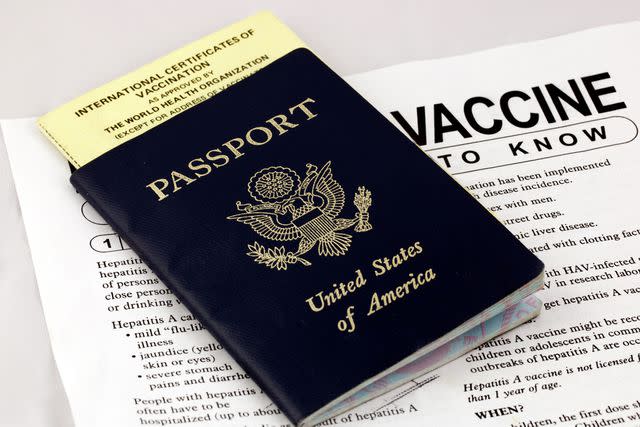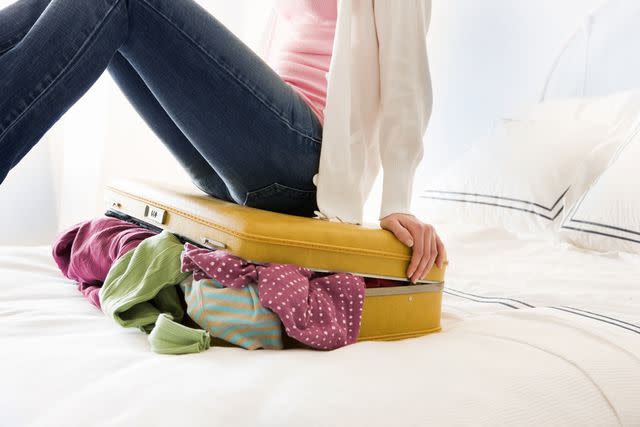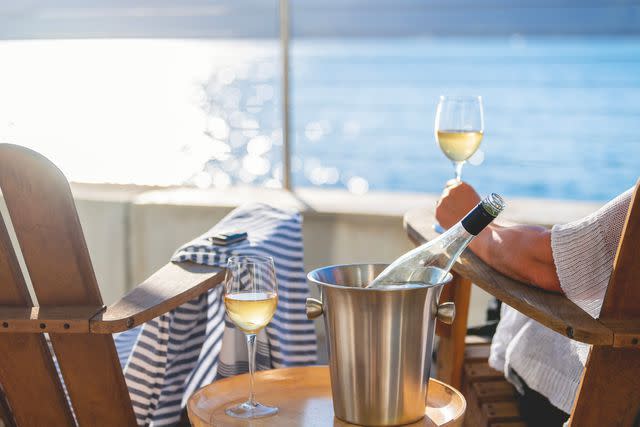15 Mistakes to Avoid on a Cruise, According to Experts
Here's how make sure everything is smooth sailing.

Gary D Ercole/Getty Images
While cruises might appear to be a pretty straightforward type of vacation, there's more to them than you might think. It can be fairly easy to make a misstep here and there — and some could easily ruin your entire trip. So, whether you're booking a cruise for the first time or you already have your reservations, check out this list of mistakes to avoid on your next sailing.
Booking Your Flights Too Close to Embarkation and Disembarkation
Always book a flight that gets you to your port city the day before your cruise — or even earlier. That gives you a buffer period to make it to the port on time if there are flight delays or cancellations. If you miss embarkation, you may have to pay extra to catch up to your ship, or you could miss your sailing entirely. Plus, keep in mind that your luggage may not make it even if you do, and an extra day in port means you have a higher likelihood of receiving your bags.
For your travels home, you can book a flight on the same day as disembarkation, but make sure it's not too early. Disembarkation can be a lengthy process, and the airport may be a far distance away. "It's a mistake to book a flight before 11 a.m. for an airport near the cruise port and before noon if there's a considerable drive, like at Port Canaveral," said Tanner Callais, founder and editor of Cruzely.com. "Sure, you might make an earlier flight, but it adds a lot of stress in making [it to] the airport on time, especially if there's any delay."
Not Having a Valid Passport
Always check your passport's expiration date. You'll likely have three to six months of validity on your passport, meaning the expiration date must be three to six months after the end of your trip. "I’ve seen many mishaps when it comes to not having proper documentation, especially when it comes to expiration dates," said Jeff Rolander, vice president of claims at travel insurance company Faye.
Not Checking COVID-19 Restrictions

JodiJacobson/Getty Images
"Some travelers may be under the false impression that the world is as open and vaccinated as their home country, but this may still not be the case. Checking the requirements with regards to vaccinations, mask specifications, and mask wearing in the various destinations you're visiting is essential, especially if your itinerary is multicountry," said Jeremy Clubb, founder of Rainforest Cruises.
Not Monitoring Prices After You Book
Cruise pricing is typically dynamic, which means it varies based on demand. Sometimes, the prices might actually drop after you've booked — and you may be able to get a price adjustment. "We have a tracking tool we use to watch sale prices, so if a price drops before final payment, we usually know about it before our clients and can proactively adjust the price," said Stephanie Goldberg-Glazer, owner of travel agency Live Well, Travel Often.
Skipping Travel Insurance
"This oversight can cost a traveler far more than just the price of the cruise. The fact is that most domestic health insurance policies do not cover the member, including standard Medicare, after a cruise ship reaches international waters," said Michelle Couch-Friedman, founder and CEO of Consumer Rescue. "The cost of medical treatment on board a ship is extremely high. Without travel insurance that includes a medical component, if a cruiser becomes ill or injured and needs treatment, they'll be on the hook for all the expenses. Worse, if a passenger needs to be medically evacuated and they don't have insurance coverage, they could end up owing tens of thousands of dollars."
Picking a Cabin at Random

d3sign/Getty Images
"Picture this: You've booked a beautiful cruise, but you end up in a cabin right under the all-night disco. That's the consequence of not researching the ship's layout and picking your cabin based on preferences," said Kristin Winkaffe of Winkaffe Global Travel. "To sidestep this dance-floor fiasco, take a deep dive into the ship's blueprint, cabin categories, and amenities, or consult with a travel advisor who can guide you to serene slumber."
Furthermore, if you're prone to seasickness, you should be particular about your cabin's location. "Stick to a mid-ship cabin — not too high of a floor and as mid-ship as possible," said travel advisor Ashley Les of Postcards From, an independent affiliate of Protravel International, Global Travel Collection. "And above all else, avoid the front of the ship, as it has the most movement."
Taking Only Ship-affiliated Shore Excursions
You're never obligated to take the shore excursions offered by a ship, and, in fact, you might even be able to get a great deal by booking with a third party. For instance, if you're on a cruise that stops at Bora Bora, you can book a day pass at luxury hotels like The St. Regis Bora Bora and use their pools, beaches, and amenities such as restaurants and spas. Or, you can simply choose to do your own thing at a port.
Arriving Late to the Pier After a Day in Port
"If you're out exploring the port on your own, get back to the ship well before the slated embarkation time," said travel advisor Christina Schlegel of Bluetail Travel. "We've all seen late passengers running down the pier at the last minute. Sometimes, they make it; sometimes, they don't. Check the boarding time for each port and add plenty of buffer time to that, even more if it's a tender port."
Waiting to Book Everything Until the Last Minute
On larger ships, specialty dining, spa treatments, and shore excursions can book up well in advance. Pay attention to when your cruise line opens bookings for these add-ons and reserve them ASAP. This also applies to booking third-party excursions. "Many people assume that when the ship docks, they'll immediately have entertainment and/or transportation options waiting for them. This is not always the case," said Alissa Musto, a traveling musician, singer, and performer with two years of experience working on cruises. "Especially in Central America, attractions are not accessible immediately off the ship and some sort of tour needs to be arranged ahead of time. By waiting until your cruise to get a game plan for your port days, you'll have to rely on ship Wi-Fi, which [can be] slow and expensive, to do research on what to do, or rely on the excursions the cruise line offers, which can sell out quickly."
Overpacking or Underpacking

stevecoleimages/Getty Images
"Overpacking could lead to a wardrobe avalanche in your cabin, while forgetting essentials might have you hunting for sunscreen in a remote port," said Winkaffe. "To strike the perfect balance, create a packing list that includes versatile clothing that can be layered, your everyday and most common special-use toiletries, enough of your medications to last you a few extra days in case of delays, and any specialty gear for excursions." Winkaffe also advises checking your ship's dress code, as you may need to pack special outfits for formal or theme nights.
Not Keeping Essentials in Your Carry-on
Your checked bags will be delivered to your cabin by porters, but this process often takes hours. Always pack your essentials and valuables — medication, chargers, and electronics — in your carry-on. And don't forget anything you might need for your first day on board. "Pack your swim gear in your carry-on. Your big luggage will be ported to your room, and you might not see if for a while, missing out on all the early swimming time on the first day," said Stephanie Shuster, founder and CEO of Walt Disney World Magazine and Disney Cruise Magazine.
Forgetting to Put Your Phone on Airplane Mode
"If you don't have an international plan that covers your destinations, put your phone on airplane mode and use Wi-FI so you’re not charged for using data when you shouldn’t be," said Rolander. Even if your plan does cover international data, it may not cover data at sea, so this advice still applies.
Thinking Everything Is Included
Most cruises are not truly all-inclusive — everything from alcohol to specialty dining to excursions typically costs extra. Read the fine print carefully, then set a reasonable budget for your onboard spend. "When you pay your cruise fare, you might think you're done spending, but that's a mistake. You really should think of the trip as two costs — the cost of the cruise itself and then the cost of things on board," said Callais. "We all want to save money, but onboard spending can enhance the trip greatly. Whether it's eating at a specialty restaurant versus the free buffet, or taking a shore excursion, these often turn out to be some of the highlights of the cruise. You just have to prepare yourself mentally for the extra spend."
Leaving Alcohol at Home

courtneyk/Getty Images
"Most cruise lines allow passengers to bring their own wine and/or Champagne on board. Rules vary by cruise line, and limits and corkage fees often apply," said Pierre-Olivier Lepage, cofounder and CEO of Cruisebound. "Research your cruise line’s policy before deciding whether or not to book a drinks package. Drink your stash of alcohol in your cabin to avoid corkage fees at the restaurant."
Booking Your Next Cruise After You Get Home
If you love your cruise so much and are ready to book your next one, do so on board. "There are usually massive savings for doing this early," said Shuster.
For more Travel & Leisure news, make sure to sign up for our newsletter!
Read the original article on Travel & Leisure.

